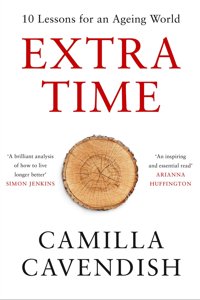Extra Time: 10 Lessons For An Ageing World, by Camilla Cavendish

Roula Khalaf, Editor of the FT, selects her favourite stories in this weekly newsletter.
Midway through her new book on ageing, Camilla Cavendish recalls a time as political aide to David Cameron “when I was called a ‘health fascist’ by one of the prime minister’s other advisers”. Her crime was to propose a sugar tax to combat obesity — a then-controversial measure that was eventually introduced in the UK in 2018.
Having left government, Cavendish began thinking about the ways health issues like obesity could complicate the relentless progress of human longevity. The result is this brisk and thoughtful exploration of the dilemmas of a world that will soon house more people aged over 65 than under five for the first time.
The titular “extra time” refers to the late-life renaissance now enjoyed by many of those we once called elderly. “It’s not old age that’s getting longer, it’s middle age,” she writes. “We need to . . . stop lumping everyone from 60 to 100 together, and accept its normal to be vibrant and capable in your 70s”.
A similar vein of optimism runs through the book, which zips entertainingly from Japanese eldercare robots and senility-battling cognitive retraining apps, to the sweeping possibilities of future anti-ageing drugs. But Cavendish grapples with the darker realities of demography too, especially when writing touchingly about her father, the academic Richard Cavendish, whose retirement was marked by depression borne of an inability to replace the sense of purpose he felt during his working years.
Two forces lie behind ageing across the rich world: people are living longer and families are having fewer children. The latter trend, in particular, has proven difficult to reverse. Frontier elderly societies such as Japan and Singapore offer arrays of procreation sweeteners, few of which seem to succeed.

At base, increasing birth rates means lowering the cost of having children — in particular for women. This, in turn, requires changes to work cultures for both sexes, alongside more generous childcare policies. Such ends are not impossible: Germany recently managed to nudge up its birth rate via heavy social investment, helped along by higher levels of immigration. But few other nations seem likely to spend as generously.
Much as with climate change, if reversal is not possible then adaptation comes next. As might be expected from a political adviser (now a Financial Times columnist) Cavendish lays out plenty of ideas.
New kinds of institutions will be needed. Japan’s so-called silver centres provide one model, helping older people volunteer or find part-time work. In Germany, state-backed Mehrgenerationenhäuser (multigenerational houses) bring together nurseries and elderly care. American fresh-food pharmacies help people to eat better, and thus stay healthier later in life. Welfare must be rethought too, in part by replacing systems that redistribute from needy youngsters to the flourishing old. For the UK, Cavendish backs a German-style, mandatory, eldercare social insurance scheme as well.
Yet happiness in old age is as much a matter of psychology as policy. We must all expect to work longer, Cavendish argues — and should welcome doing so given that work wards off the kind of lack of purpose that bedevilled her father. “I feel strongly that older people should not be made to give up work and that we must challenge the narrative of ‘golden’ early retirement,” she writes.
Whether all this is possible depends on politics. Ageing societies will see deepening divides between young and old, of which the current debate over Brexit is merely a foretaste. Those nations that have slowed the onset of ageing have mostly done so via higher immigration, which brings other social tensions with it.
Inequality will be the deepest problem of all. Little of how long humans live comes down to genetics, hence why those who eat well and stay active die later than those who do not. Yet this fact is only likely to open up new fissures between the long-lived rich and the rest. Today’s wealthiest and most educated may well live a full decade more than those at the bottom of the social tree. That extra time will be a boon. But a world of numerous nonagenarians will soon add extra political complications too.
James Crabtree is an associate professor of practice at Singapore’s Lee Kuan Yew School of Public Policy
Extra Time: 10 Lessons For An Ageing World, by Camilla Cavendish, HarperCollins, £20
Comments